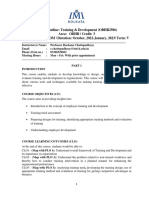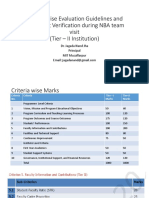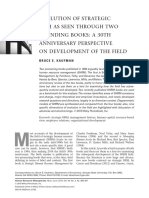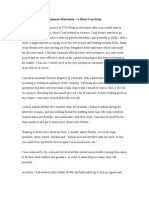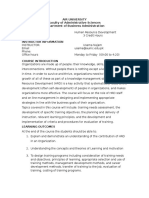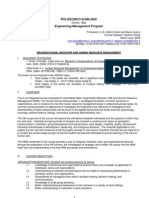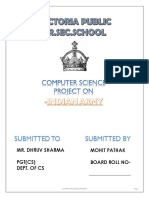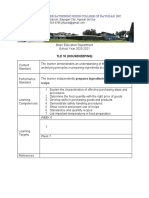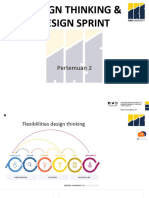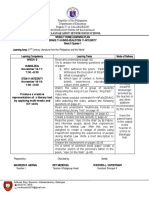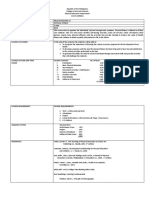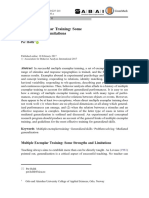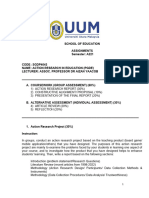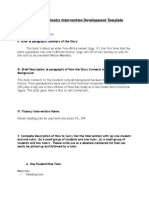COURSE OUTLINE
NAME OF PROGRAMME Bachelor of Science Degree in Management (BDM)
September 2022 – August 2023
ACADEMIC YEAR & TERM
Term III: May – August 2023
HMGT 0401 - Learning and Development (4 credits)
NAME OF COURSE & COURSE CODE
Friday 5:00pm - 8:00pm (Online)
Rhonda O’Neil, MBA, BBA
LECTURER INFORMATION
Email: rhonda.oneil@roytec.edu
CONSULTATION TIME ½ hour before and after class
COURSE OVERVIEW
This course explores modern practices in organisations geared toward ensuring that employees have the
knowledge, skills and abilities to function effectively in their current roles and prepare them for future
opportunities to make valuable contributions within the organization.
The course takes a systems approach to learning and development and will engage the Instructional Systems
Design model for undertaking steps in conducting needs analysis; design and delivery for performance
improvement. The course therefore focuses on best practices to realize enhancements in human capital so as to
support the achievement of organizational objectives. Topics covered include: the learning and development
process, the needs analysis process, the motivation to learn, design, development and delivery techniques,
transfer of learning, learning and development methods, development of facilitation skills, learning and
development evaluation, trends and best practices in learning and development.
LEARNING OUTCOMES
Upon completion of this course, students should be able to do the following:
1. Apply Knowledge of key theories, frameworks and models associated with learning and development.
2. Conduct an organizational and individual needs analysis
3. Design and develop learning and development interventions aligned to the needs of the organization.
4. Demonstrate skills in facilitating a program designed at up-skilling employees.
5. Evaluate the effectiveness of learning and development initiatives.
RESOURCE MATERIAL
Recommened Text
Haccoun, Robert, and Alan, Saks. Managing Performance Through Training and Development, 6th ed., Nelson
Education, 2015.
Additional Resources:
A list of journal articles will be provided.
Page 1 of 6
�EVALUATION & ASSESSMENT
This course will be assessed as follows:
HMGT 0401 – Learning & Development
Behaviour / Activity Proposed Weighting Due Dates
Attendance & Participation 10% Sessions 1 - 12
Group Seminar 20% Sessions 4 - 8
Group Project Paper 20% Sessions 9 & 10
Group Project Presentation 15% Sessions 9 & 10
Individual Research Paper 35% Session 12
Total 100%
GROUP SEMINAR (20%)
This course component requires you to work in groups (group size to be determined by the instructor). Students
will be asked to form their own groups on the first day of class and will be provided with a list of topics. Groups
will be required to finalize their topics with the instructor before they leave class. Each group must cover a
different topic. Presentation dates will be assigned by the instructor.
What is a seminar?
A seminar is a joint discussion among all class participants about the topic under consideration. The student-
leaders are expected to guide the discussion (see below), but all class members are expected to contribute to the
dialogue.
Why use a seminar format?
There are many reasons for using a seminar format, but the most important is that the seminar should be a
learning experience for all involved, including the seminar leader(s), the students, and the instructor. A well-run
seminar should promote an engaging discussion of the topic and a meaningful exchange of ideas.
What should the seminar leaders do?
The seminar leaders are to present information on the assigned topic, and lead a discussion of the material. The
presentation should normally take 2.5 hours (seminar leaders should ensure a break is provided for their
classmates).
The leaders should:
Do thorough research on the topics. This requires a review of the recent literature and applicable theories and HR-
related laws relevant to the topic.
Make sure to actively engage the other students in the discussion in a meaningful manner.
Make effective use of audio-visual aids to support your presentation. Copies of presentation slides must be e-
mailed to the instructor on the day of the presentation.
As seminar leaders you are being trusted to facilitate a meaningful learning experience for your classmates. If a
presentation is going poorly, and topic coverage is being lost, seminar leaders may be asked to stop their
presentation. If such an instance occurs, the instructor will lead the class, and a presentation mark of F will be
assigned to the seminar leaders.
What are the expectations for the other (non-leading) students?
Student participants, who are not leading a seminar, should have read all of the assigned readings in order to
engage in a meaningful discussion on the topic. Students should be prepared to answer questions posed by the
seminar leader regarding the readings. Also, as stated above, students are expected to contribute to most, if not
all, discussions.
Page 2 of 6
�What should the seminar leaders expect from the instructor?
During preparation, I will provide the following: 1) consultations for the group regarding the content of the
presentation; 2) help with procuring audio-visual equipment; 3) assignment of appropriate readings for the class to
prepare them for the discussion.
During the actual presentation the focus of the instructor will be on evaluation. I will, on occasion, ask questions
for clarification or perhaps make points for additional consideration. Do not, however, expect me to explain
concepts/research findings, etc. on behalf of the seminar leaders as part of the seminar presentation. I will give
this type of advice prior to the seminar, but any questions for clarification should be asked before the seminar as
part of the preparation.
How will the seminars be evaluated?
The seminars will be evaluated based on the organization, clarity, content, thoroughness, as well as the leaders’
ability to answer questions about the topic. Please note that this is to be an engaging oral presentation. Reading
from a prepared script will not be evaluated favourably. In the absence of extenuating circumstances such as class
cancellation due to weather, failure to present a seminar as scheduled will result in an F for the course.
Due Date: Dates to be assigned.
GROUP PROJECT PAPER (20%) AND GROUP PROJECT PRESENTATION (15%)
Early in the course you will be asked to form a group of about 5-6 students (based on size of the class). Your group
will be required to make a presentation to the class on a learning and development topic of your choice (see
suggested topics on the next page). The purpose of the presentation is to help develop presentation skills and
provide students hands-on experience with a variety of training techniques. I will be grading both the content and
the style of the presentation. Ideally, each group will present a different topic (i.e., I may have to allocate topics on
a first-come, first-served basis if two different groups wish to present on the same topic). Each group will be given
about 20 minutes for its presentation (including question & answer time).
INDIVIDUAL RESEARCH PAPER (35%)
Your paper will be based upon the information you presented either in the group seminar presentation or group
project presentation. It should be 12-15 typed, double-spaced pages, normal sized font (e.g., Times New Roman 12
point, Arial 10 point), and in MLA style. Grades will be lowered for poor use of spelling and grammar. All
exhibits/appendices must be professionally prepared.
List of Presentation Topics
• Leading with Emotional Intelligence
• Preventing harassment in the workplace
• Designing On-boarding Programs
• Presentation Skills for Sales Officers
• Fostering Inclusion in the workplace as a strategic competitive advantage
• Family Friendly Programs as a Retention Strategy
• Safety Training for Police Officers and Fire Fighters
• Buddy Systems and Mentorship Programs
• The death of face-2-face training and rise of strictly on-line learning
CONVERSION OF LETTER GRADE
Percentage Grade Percentage Grade
Letter Grade Letter Grade
Range Point Range Point
A+ 90-100 4.3 B- 70-72 2.7
A (Excellent) 85-89 4.0 C+ 65-69 2.3
A- 80-84 3.7 C (Satisfactory) 55-64 2.0
B+ 77-79 3.3 D (Less than Satisfactory) 50-54 1.0
B (Good) 73-76 3.0 F 0-49 0.0
Page 3 of 6
�ASSESSMENT REQUIREMENTS
Plagiarism is the unacknowledged presentation of the work of others as one’s own. To represent such work as self-
created is dishonest and academically unacceptable. Plagiarised material will not be graded and students will
receive a failing grade for the following:
• Quoting verbatim or almost verbatim from a source (such as copyrighted material, notes, letters, business
entries, computer materials) without acknowledgement;
• Adopting someone else’s line of thought, argument, arrangement, or supporting evidence (such as, for
example, statistics, bibliographies) without indicating such dependence;
• Submitting someone else’s work, in whatever form (such as film, workbook, artwork, computer materials)
without acknowledgement; and
• Knowingly representing as one’s own work any idea of another.
Preparation of Course Assignments and Assessments: The MLA (Modern Language Association) style is most
commonly used to write papers and cite sources within the liberal arts and humanities and is the approved
method for presentation of written work at UWI-ROYTEC. Examples for the general format of MLA research
papers, in-text citations, endnotes/footnotes, and the Works Cited page can be obtained at
http://owl.english.purdue.edu/owl/resource/747/1 or MLA Handbook for Writers of Research Papers (7th ed.) and
the MLA Style Manual and Guide to Scholarly Publishing (3rd ed.), which are available in the Library. Students may
also refer to the text used in the course ENGL 0105 Business Communication, Kolin, Philip. Successful Writing at
Work. Boston: Houghton-Mifflin, 2004. Students are reminded that direct quotations, facts and figures, as well as
ideas and theories, from both published and unpublished works must be referenced. Referencing is a standard
method of acknowledging sources of information and ideas that have been used in assignments in a way that
uniquely identifies their source. Penalties for failure to reference your work will be applied under UWI-ROYTEC’s
Policy on Plagiarism.
You are responsible for making yourself familiar with the Student Handbook (Academic Regulations) 2022-2023,
Academic Offenses (Plagiarism) which is available online at www.roytec.edu in the Student Services section.
Academic dishonesty also includes a failure on your part to keep your current and past assignments out of the
hands of other students who may misrepresent their origins. It is also recommended that you keep a record and/
or rough drafts of written or other work until you have received your final grade.
Notices and Communication: Please note that all official notices to students will be posted in the Student Services
section of the website www.roytec.edu and on the student server at http://myroytec.roytec.edu where other class
materials can also be accessed. You are encouraged to regularly check the websites and other Notice Boards
located in the classrooms and throughout the building for changes and new information to students.
Missed Coursework/Tests, Late Submissions: No make-up test will normally be given. If a scheduled test is
missed, the student will receive zero for that particular test unless supporting evidence of illness, emergency, and
other circumstances outside of your control is submitted. All papers are due on the date assigned. Failure to
complete any course assignments will affect your final course grade.
ATTENDANCE AND PARTICIPATION (10%)1
Attendance and participation are highly connected practices within the academic pursuit. However, we will take
the time to explain these concepts as understood within the UWI-ROYTEC academic culture. It is unlikely that a
student will be able to participate in course activities if they are not present in class to participate in discussions
and collaborative activities. The total marks awarded for attendance and participation will be 10 % of the marks
earned for the entire course; 5% will be allocated for attendance and (5%) allocated for participation.
On the matter of attendance and GATE Funding: Each student is expected to attend all scheduled classes (lectures,
laboratory, tutorial sessions and make up classes). In order to be eligible for GATE Funding, attendance is
compulsory for the first six (6) weeks of scheduled teaching sessions for each course. In the event that attendance
1
Note that for courses in the Management Science and Mathematics department the maximum allocation for
attendance and participation is 5%.
Page 4 of 6
�is missed in the first six (6) weeks, students will forfeit GATE funding and be required to pay the requisite tuition
fee.
All cases of absenteeism will be reported to the UWI-ROYTEC Board of Examiners and to the relevant Government
Ministry where GATE Funding is applicable, and also to other sponsors. You are reminded that signing the
Attendance Register for another student is an academic offence.
Punctuality at lectures is absolutely essential. Students arriving late disrupt the learning environment. Therefore,
each student is expected to be present at least ten (10) minutes before the scheduled start time of each lecture,
laboratory and tutorial sessions.
Measuring attendance (5%)
Failure to attend classes on a regular basis and actively participate will affect your final grade. Any student who
misses more than two classes will forfeit marks which has been allocated for Attendance according to the
following scale:
• 2 classes missed – no penalty
• 3 classes missed- 25% of the raw score forfeited
• 4 – 6 classes missed- 50% of the raw score forfeited
• More than 6 classes missed- 0 marks will be awarded for attendance
Measuring Participation (5%)
The following rubric will be used to score participation.
Criteria Excellent Good Poor
(1 mark) (0.5 marks) (0 marks)
Preparation Student consistently displays excellent Student often displays Student demonstrates no
for class preparation and is familiar with the good preparation and is preparation for class and
relevant readings. most times familiar not abreast with related
with the relevant readings.
readings.
(2 marks) (1 mark) (0 marks)
Contributions Students offer relevant ideas, analysis Student provides views, Shows minimal awareness
to and interpretation, and insightful and offers related of the flow of discussion.
conversation conclusions. analysis, facilitates
some clarification of
the ideas of others.
(2 marks) (1 mark) (0 marks)
Development Student’s contribution to the discourse Student’s contribution Student’s contribution to
of ideas demonstrates critical or reflective to the discourse the discourse operates at
thinking and can relate current discussion demonstrates critical the descriptive level.
to other course concepts with examples. thinking. Student recognises the
Student thoughtfully evaluates the ideas Student builds on ideas of others but do not
of others and builds upon their others’ comments. evaluate them.
comments.
COURSE SCHEDULE
Session
Topic Readings
No.
1 Introduction – Course Overview and Expectations. Seminar topics assigned. -
Overview of the Learning and Development Function. Chs 1 & 2
2
How to conduct a seminar.
Conducting Effective Research -
3
Seminar Consultations
4 Seminar Topic #1 – How Individuals Learn and What Motivates Learners Ch 3
Page 5 of 6
�Session
Topic Readings
No.
Seminar Topic #2 – The Needs Analysis Process & Costs and Benefits of Learning and Chs 4 & 12
5
Development
6 Seminar Topic #3 – Instructional Design Methods Chs 5 -8
7 Seminar Topic #4 – The Essentials of Training Delivery & The Transfer of Learning Chs 9 & 10
Seminar Topic #5 – How to Evaluate the effectiveness of training programs & Ch 11 & 14
8
Management and Leadership Development
9 Group Project Presentation
10 Group Project Presentation
11 Individual Research Paper Consultations
Individual Research Paper Due
12
Course Wrap Up
Page 6 of 6


















